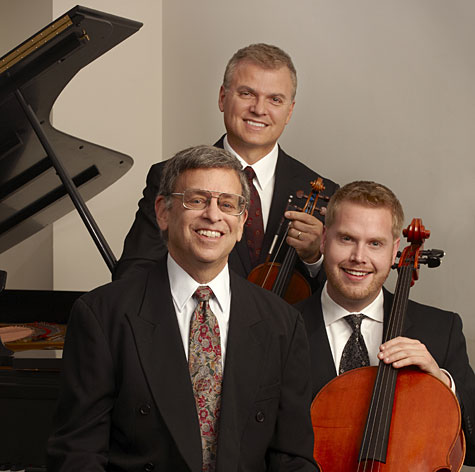
In 1795, Ludwig van Beethoven debuted one of his earliest compositions, a set of three piano trios, at the home of Prince Karl von Lichnowsky in Vienna. Among the guests was Franz Joseph Haydn, Beethoven’s occasional mentor and himself a pioneer of the form.
Yet Beethoven, never lacking for confidence, departed from Haydn’s example in two important ways. While piano tended to dominate Haydn’s trios, Beethoven demanded equal contributions from cello and violin. And while Haydn typically employed three movements, Beethoven opted for four.
Afterward, Beethoven asked his teacher for feedback. Exhausted by a recent trip to London, the 63-year-old Haydn suggested a little more work might be necessary before publication.
Today, of course, Beethoven’s trios are regarded as masterworks. At 8 p.m. Wednesday, March 26, Washington University in St. Louis’ Eliot Trio will perform the first of them — the Piano Trio No. 1 in E-flat Major, Op. 1 — as part of its annual concert in Holmes Lounge, Ridgley Hall.
Martinů, Beethoven and Dvořák
Named for WUSTL founder William Greenleaf Eliot, the Eliot Trio consists of Seth Carlin, professor of music in Arts & Sciences and director of the piano program; violinist David Halen, concertmaster for the St. Louis Symphony; and cellist Bjorn Ranheim, also with the St. Louis Symphony.
The program will open with Piano Trio No. 2 in D minor, H. 327, by Bohuslav Martinů. A prolific composer, Martinů was born in Polička, Czechoslovakia, and spent much of the 1920s and ’30s in Paris, where he was deeply influenced by jazz and the neo-classicism of Igor Stravinsky.
But in 1941, as Hitler’s army advanced, Martinů fled for the United States, where he remained in exile until 1953. The D minor trio, composed in 1951, represents both the difficulties and triumphs of that period. Written in a matter of weeks, the piece opens in a tender, contemplative mood that builds, over the course of its four movements, to a dynamic, tour-de-force finale.
Next on the program will be Beethoven’s Piano Trio No. 1. Concluding the evening will be Antonín Dvořák’s Piano Trio No. 4 in E minor, Op. 90, “Dumky.”
Taking its name from the traditional dumka — a type of Slavic (some say Ukrainian) folk song — the Dumky trio boasts a highly unusual six-part structure, alternating slow, elegiac sections with bright, energetic passages. The result is both one of Dvořák’s best-known works and a dramatic challenge to the familiar three- and four-movement sonata.
Tickets
Tickets are $25, or $15 for seniors and Washington University faculty and staff, and $5 for students. Tickets are available through the Edison Theater Box Office, 314-935-6543, or at edison.wustl.edu.
Holmes Lounge is located in Ridgley Hall, on the far side of Brookings Quadrangle, near the intersection of Hoyt and Brookings drives.
For more information, call 314-935-5566 or email daniels@wustl.edu.